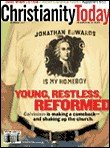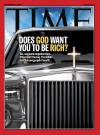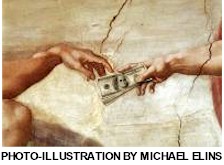
Greg Boyd is a breath of fresh air in a Christian milieu that has become active in political issues from mostly a conservative, Republican vantage point. In his book,
The Myth of a Christian Nation: How the Quest for Political Power Is Destroying the Church (Zondervan, 2006), Boyd takes on the Christian Right with dogged determination.
I agree with Boyd when he says,
"A significant segment of American evangelicalism is guilty of nationalistic and political idolatry… For some evangelicals, the kingdom of God is largely about, if not centered on, 'taking America back for God,' voting for the Christian candidate, outlawing abortion, outlawing gay marriage, winning the culture war, defending political freedom at home and abroad, keeping the phrase 'under God' in the Pledge of Allegiance, fighting for prayer in the public schools and at public events, and fighting to display the Ten Commandments in government buildings." (p. 11)
However, his theological solution is to say that since there is "the kingdom of God" and there is the "kingdom of the world," all government is in the latter category and not in the former category. Not only that, but…
"Fusing together the kingdom of God with…the kingdom of the world is idolatrous…This fusion is having serious consequences for Christ’s church and for the advancement of God’s kingdom." (p. 11) "The kingdom Jesus came to establish is 'not from this world' (John 18:36), for it operates differently than the governments of the world do. While all the versions of the kingdom of the world acquire and exercise power over others, the kingdom of God, incarnated and modeled in the person of Jesus Christ, advances only by exercising power under others. It expands by manifesting the power of self-sacrificial, Calvary-like love." (p. 14)
While there is no doubt that there is a battle between the Kingdom of God and the Kingdom of Satan, Boyd mistakenly places all government into the realm of the Kingdom of Satan. This dichotomy is the basic premise of the entire book. There are two kingdoms, one of God, one of the world, and
all governments are a part of the kingdom of the world—all governments are ruled by Satan.Boyd often cites Jesus’ words in
John 18:36,
“My kingdom is not of this world. If it were, my servants would fight.” He therefore makes the connection that since governments fight and force “power over” others with the
“sword” (see
Romans 13), then government is not of God’s kingdom, it is “of this world.” He furthers this assessment by pointing out that when Satan tempted Jesus in the desert (
Luke 4:5-6), he showed Jesus
“all the kingdoms of the world” and said,
“I will give you all their authority and splendor, for it has been given to me, and I can give it to anyone I want to. So if you worship me, it will all be yours.” He links this to
Revelation 11:15, where he sees a future in which the kingdom of the world (that is, all the governments of the world that are ruled by Satan will
“become the kingdom of our Lord and of his Christ, and he will reign for ever and ever.”) In other words, all governments are actually under one authority, Satan, and Christ’s authority as the King is delayed until that time.
“The kingdom person is to remember that it’s still a 'Good Friday' world. We are to have faith that things will look different when Easter morning arrives. The ultimate hope if the world is not found in achieving victory now. The ultimate hope of the world is the resurrection, when all things shall be reconciled to God (Col. 1:20)." (p. 186)
Therefore, Boyd insists that kingdom people are to live in light of Calvary. He says that kingdom love always looks like Christ, suffering on the cross for sinners. There is certainly truth in that. Christians are to first seek to serve the people of this world, loving them as Christ did.
While I whole-heartedly agree that the Christian life must be shaped by Calvary love, Calvary is not the
end of the story.
We are not living in pre-resurrection times, as Boyd puts it. We live in light of the fact that the resurrection has already occurred and that Christ has indeed triumphed over Satan. Satan is certainly still active in this world, but he is a defeated foe. The resurrection represents the dawn of the New Creation, and Christians are empowered by that resurrection God to be the very agents of redemption in this world. After the resurrection, Jesus told his disciples,
“All authority in heaven and on earth has been given to me. Therefore go and make disciples of all nations” (
Matt 28:18-19). The shift in authority from Satan to Christ does not wait for the future; it is already accomplished through the resurrection. Contrary to Boyd’s words, we are living in an “Easter morning world.”
In that last quote from Boyd, he cites Colossians 1:20. If we read that verse in context, it’s clear that the hope of the death and resurrection of Christ is the redemption of all things.
“16 For by him all things were created: things in heaven and on earth, visible and invisible, whether thrones or powers or rulers or authorities; all things were created by him and for him. 17 He is before all things, and in him all things hold together. 18 And he is the head of the body, the church; he is the beginning and the firstborn from among the dead, so that in everything he might have the supremacy. 19 For God was pleased to have all his fullness dwell in him, 20 and through him to reconcile to himself all things, whether things on earth or things in heaven, by making peace through his blood, shed on the cross.” (
Colossians 1:16-20)
Boyd seems to think that these verses refer only to a time in the future, when reconciliation will ultimately be accomplished. Granted, we cannot say that ultimately all things are already reconciled through Christians engaging in political processes. But the emphasis of the passage is not merely on that future ultimate reconciliation but rather on the fact that Christ not only created all things (including, Boyd should note,
the “thrones, powers, rulers and authorities”), all things were created “for him.” All these things, including the “powers” that Boyd insists are a part of Satan’s “kingdom of the world,” are meant to be a reconciled back to God, for “God was pleased to have all his fullness dwell in Christ, and through him to reconcile to himself all things.”
Therefore, I applaud Boyd’s arguments that the rise of the Religious Right does not best represent this Christian vision of reconciliation and I also agree that the myth of America being a Christian nation does more harm than good.
However, Boyd’s solution to the problem is to hand over the government to Satan by saying it is his for the having. According to Boyd, government is evil because it is
ontologically evil; government itself is
a fallen power (not just an institution that is
under the influence of evil powers).
Boyd attempts at times to hedge his words by saying that its okay for Christians to participate in the political process of the kingdom of the world (as long as they know that this is not a uniquely “kingdom of God” endeavor). However, the dualism of saying that the Kingdom of God does not include political engagement in this world keeps Christians from being the fully redemptive body of Christ we are called to be in this world.
Christ is King of all things, and he is reconciling to himself all things that are not ontologically evil through his kingdom people.
___
Posts in this series:
Intro
Chapter 1
Chapter 2
Chapter 3
Chapters 4 & 5
Reflection: Boyd and Colossians 1
Chapters 6 - 8 Chapter 9Wrap-up Reviewtechnorati: politics, social action, emerging church
 This page will give you the background of what has happened to me and when I’m allowed to have visitors. Linda will be able to easily update my status under “news updates.” Linda’s phone number and e-mail address are there as well so that you can encourage her!
This page will give you the background of what has happened to me and when I’m allowed to have visitors. Linda will be able to easily update my status under “news updates.” Linda’s phone number and e-mail address are there as well so that you can encourage her!
 The current issue of Christianity Today features the cover story, “
The current issue of Christianity Today features the cover story, “

 Greg Boyd is a breath of fresh air in a Christian milieu that has become active in political issues from mostly a conservative, Republican vantage point. In his book,
Greg Boyd is a breath of fresh air in a Christian milieu that has become active in political issues from mostly a conservative, Republican vantage point. In his book, 






 What have Christians learned from 9/11? I fear that we have not learned much. And there are a lot of lessons to be learned (feel free to add your own). While the nation may have reasons to defend itself and engage in war, Christians must understand some things that we have not yet grasped.
What have Christians learned from 9/11? I fear that we have not learned much. And there are a lot of lessons to be learned (feel free to add your own). While the nation may have reasons to defend itself and engage in war, Christians must understand some things that we have not yet grasped.